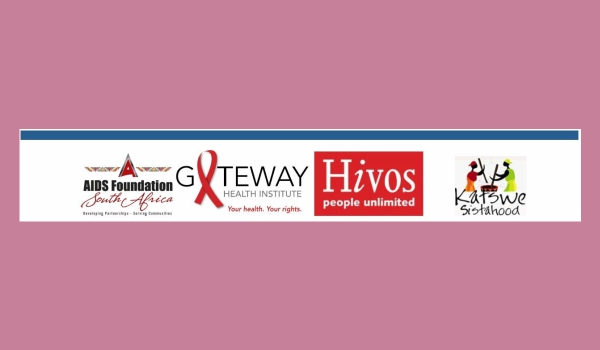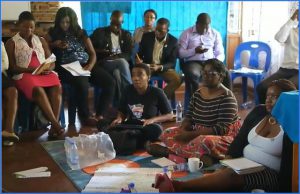
Thabisani Ncube, Sex Rights Africa Network Coordinator, AIDS Foundation of South Africa writes:
We carried out a Network Learning Discussion on 26 March 2018 in Harare, Zimbabwe, that brought quite a number of civil society organisations (CSOs) with different capacities and operational fields who also work around ending unsafe abortion. We realised there was need for a space for CSOs working in the area to consolidate their efforts around understanding the legal framework and spaces for engaging duty bearers and policy makers. We are still going to follow up on the issue as we left it unresolved as to whether we should go for a model law on ending unsafe abortion or a call to action or even both, following up on the African Union campaign to decriminalise abortion. This is a report from that discussion meeting, which includes text from some of the documents shared there.
Some of the participants

This short video introduces the proceedings
Background
Zimbabwe did not meet the 2015 Millennium Development Goal of reducing the maternal mortality ratio by 75%. Abortion is heavily restricted and is only allowed in cases where rape or incest are the result of the pregnancy, where there is fetal impairment and where the pregnancy threatens the physical health of the patient (Termination of Pregnancy Act, Acts 29/1977, 6/2000, 8/2001, 22/2001, (1977). A recent study among 1,002 women across 127 health care facilities in Zimbabwe found that 40% of women who presented to the facilities for post-abortion care had moderate to severe abortion related complications. This means that they experienced symptoms which included (but is not exhaustive to) the following: Temperature ≥39°C or ≤35°C and a clinical sign of infection; sepsis/septicaemia; pelvic abscess or pelvic peritonitis and haemorrhage. In this study 3% were classified as a near miss, therefore narrowly escaping death, and 0.2% of women died. Women presenting to clinics with complications were mostly young and from rural areas where access to education was limited.
In Africa, most abortions are found to be unsafe in some way, suggesting regular use of dangerous invasive methods by untrained individuals. In countries where abortion is illegal or only allowed to save the woman’s life, only 1 in 4 abortions is safe. Inaccessible sexual and reproductive health care continues to be a significant threat to women’s health, safety and their fundamental rights.
Why do women have abortions?
Abortion may be medically necessary even in the case of planned or wanted pregnancies, as a life-saving procedure or to safeguard the health of the mother. Apart from such considerations, an individual may decide to have an abortion for various reasons. The decision is deeply personal and influenced by many factors. Unintended or unwanted pregnancies can have extremely negative consequences for girls and women, their babies and families. A person may also seek an abortion because of problems in their relationships. One study cited that the three most common partner-related reasons were poor relationships, partners unable/unwilling to support a baby, and partners with characteristics that made them undesirable to have a baby with. Abusive partners were also cited as a reason for seeking an abortion. Women in the study who had abusive partners (8%), explained that they wanted to avoid bringing children into abusive relationships. For many women, access to abortion when experiencing unwanted pregnancy is important for the following reasons:
- equal opportunities for women
- financial stability
- current individual life circumstances
- achieving long term goals in their life plans
- interfering with completion of education
- unprepared for the transition to motherhood for young women
- responsibility to dependents in older women
- unprepared for single parenthood
What is needed?
Most women undergoing abortion do so because they did not plan to become pregnant. It is therefore important that programmes and policies work to improve knowledge, access to and use of contraceptive methods, as well as ensuring access to safe abortion. The following recommendations to reduce unsafe abortion and increase uptake of contraceptive services:
- provision of post-abortion care should be improved and expanded
- grounds for legal abortion in the region should be broadened
- access to safe abortion services should be improved for women who meet legal criteria
- service guidelines must be written and disseminated as liberal laws don’t necessarily ensure safe procedures
- providers must be trained and governments committed to ensuring that safe abortions are available within the bounds of the law
- inform women about the risks of unsafe abortion methods
- inform and educate educators and medical professionals
- expand the range of contraceptive methods available
- gender equality and prevention of sexual and gender-based violence

******
8th African Conference on Sexual Health & Rights ‘WOMAN UP’
Youth Pre-Conference side event on safe abortion, 13 February 2018
Suggestions for Action
This side event at the conference, hosted by the AIDS Foundation of South Africa and Katswe Sistahood of Zimbabwe on behalf of the Sex Rights Africa Network, involved 51 participants from a range of civil society organisations across Africa. Participants made proposals for urgent actions to end unsafe abortion and realise the right to safe, legal abortion. The suggestions, some of which are listed below, have been organised by thematic area for discussion but are otherwise presented as expressed:
Raising awareness, reducing stigma
- There is need to be open and transparent about what abortion is.
- There is need to encourage dialogue on abortion experiences to remove the stigma around abortion.
- There is need for sensitisation on the elimination of stigma associated with abortion.
- Young people should document life stories that will show the need to invest in safe and legal abortion services.
- Open dialogues with policy makers and ministries, e.g. Ministry of Health and Ministry of Education, and demystify abortion.
Leadership
- Leaders should be accountable and should also allow young people to share what they want and they should not ignore it.
- Churches to step up! They should stop just saying ‘no’, they should come up with solutions.
- Religious and traditional leaders should be challenged and engaged on the issue as they have direct channels to the people in the communities.
Legislating for safe abortion
- Restrictions need to be removed, I know it makes men feel good to be in control of women’s bodies. Give total power to the woman; it is her body.
- Governments should just stop policing women’s bodies and respect women’s right to choose.
- Our governments should recognise the rights of women on making decisions regarding their bodies and their rights to access health care including SRHR.
- Legalisation of abortion on demand.
- Abortion should be legalised in all circumstances.
- Abortion should be decriminalised and termination of pregnancy laws should be sensitised to communities where abortion is still criminalised.
- Abortion services on demand, no burdensome procedures; array of methods e.g. medical, aspiration and surgical. No authorisation should be mandatory e.g. spousal, parental or medical and there should be no mandatory waiting periods.
- Women should not be discriminated in abortion because of their sexual orientation.
Safe abortion services
- It should be accessible, affordable and in walk-in centres.
- Government to channel resources towards ensuring [there are] abortion centres in all district hospitals.
- Just the same as there are standard fees for consultation, the same should be for abortion services.
- Nurses’ and doctors’ training curriculum should include issues of abortion and when committing to serve as health service providers they should all commit to offer abortion when there is a need.
Prevention of unwanted pregnancy
- Contraceptive use and awareness should not be left out when advocating for issues of legal abortions. Legalising abortion will not take away the burden and trauma that many women who [might] not have got pregnant in the first place if contraceptives were correctly used.
- Access to family planning should also incorporate emergency contraception.
Implementing existing commitments
- The African Union should amend the law on abortion and obligate countries to respond with immediate effect. All countries should have harmonised democratic law
- There are tools like the Maputo Plan of Action and CEDAW which provide guidelines, however, countries are not adhering to them even when they have signed to them and ratified them.
- Implementation of already existing laws on abortion through simplified procedures to access safe abortion.
- All governments [should] have a framework or guidelines that are progressive in ensuring girls and women access safe abortion.
- There is need for a roadmap on making safe and legal abortion part of the comprehensive SRH service provision – the roadmap should include reform of retrogressive laws.
- There should be innovative and creative ways to advocate for the legalisation of abortion. Historically, societies and governments have cited “abuse of abortion services and they should not be legalised” as a reason to criminalise abortion, meaning that should women have access to abortion they would abuse it and use it as a contraception method. But what if we turn this around and use a family planning framework to advocate for the legalisation of abortion. So not to say that abortion pills should be used as contraceptives but to say that access to TOP falls under methods for family planning.
Monitoring and accountability
- Victims and activists of abortion should make very loud noise on the issue.
- There is need to put more pressure on the government to prioritise women as able beings and not only focus on [the] individual aspect.
- Government need to be held accountable to the laws and legislations that already exist.
- There is also need for follow-up monitoring and evaluation on the issues raised by young people and initiatives should be prioritised.
- There is need for young people to participate in the country review of UPR, CEDAW and other relevant reviews by submitting shadow reports to the commitments.
- There should be a mechanism for data collection on abortion



